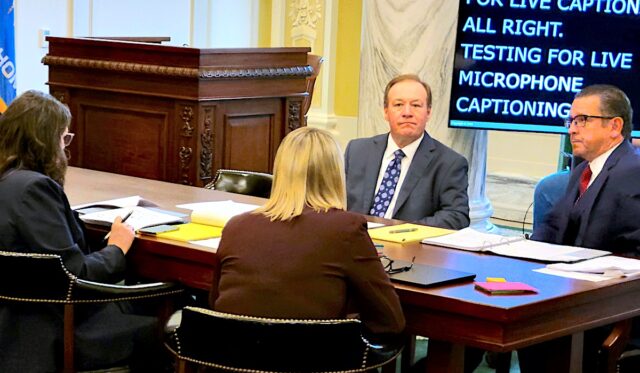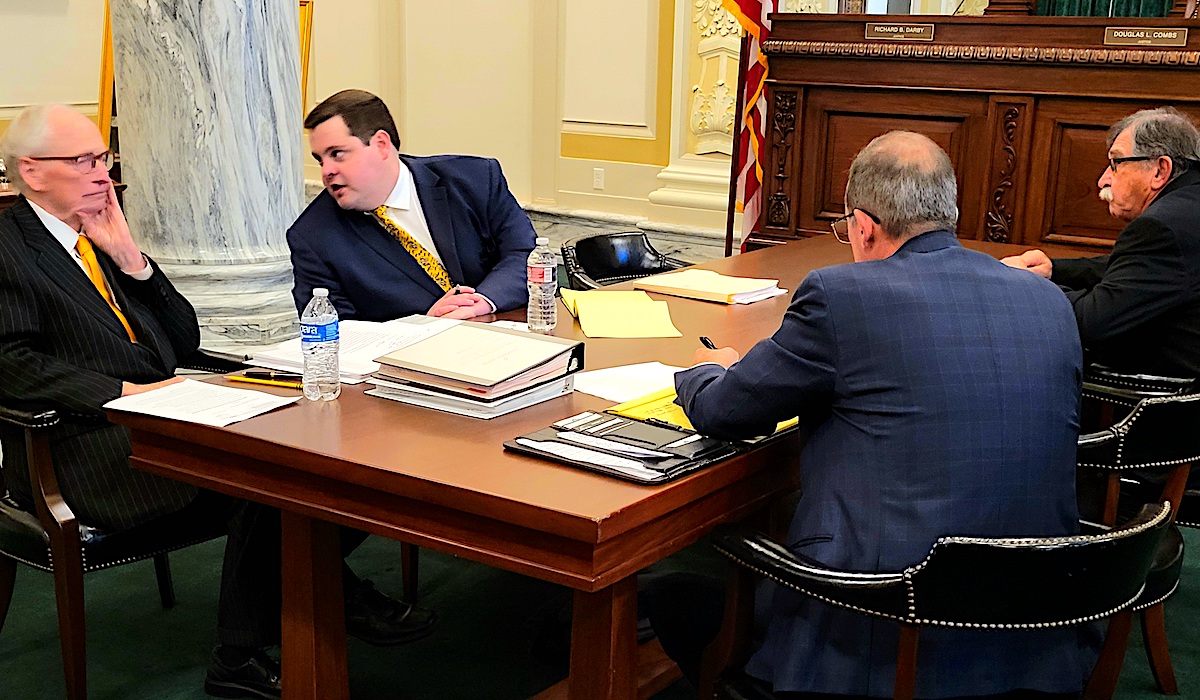
Three members of the Oklahoma House of Representatives seeking to disqualify Oklahoma Corporation Commissioner Todd Hiett from voting on cases involving companies with direct knowledge of his alleged criminal conduct should initiate impeachment proceedings against him instead of asking the Oklahoma Supreme Court to step in and order his recusal, the attorney for the embattled statewide official argued during a Tuesday hearing.
Justices lack the authority to take action against an individual commissioner, Joe White said in oral arguments.
“I’m not going to stand here and act as if I know about the Oklahoma Corporation Commission more than this court, but you’re limited,” White said. “And you’re limited because the people of the state of Oklahoma, through their hired representatives such as these House members — you cannot impeach. You cannot do what they’re trying to do through you.”
Stephen Jones, an attorney representing Reps. Kevin West (R-Moore), Tom Gann (R-Inola) and Rick West (R-Heavener), argued that the legislators don’t want to remove Hiett from office but seek only to disqualify him from cases involving Oklahoma Natural Gas Company, Oklahoma Gas and Electric Company and Public Service Company of Oklahoma because representatives of those utilities have knowledge of Hiett’s alleged misbehavior, which includes a report of sexual battery against an employee of a company regulated by the Corporation Commission.
“This is a sad, scary and awkward situation,” Jones said. “We have a situation in which a commissioner conducted himself, allegedly, grossly improperly in a public building, in a hotel around other members of other state regulators and commissioners (and) companies that have appeared before him and his own employees, and I think it’s fair to say no one has done anything about that.”
Jones, a longtime defense attorney from Enid nationally known leading the defense team for Oklahoma City Murrah Building bomber Timothy McVeigh in the late 1990s, told justices the allegations against Hiett have compromised his work because “these utilities and his employees know what he did.”
Seven of the nine justices were present for the hour-long oral arguments. Justice Yvonne Kauger, whom voters last week decided narrowly not to retain, and Justice James Winchester were not in the high court’s courtroom at the State Capitol. It’s unclear when justices will decide whether to assume jurisdiction and take up the case as requested by the three legislators.
Each of the seven justices questioned White and Jones throughout the hearing, with most of their queries dealing with why the high court is the best avenue to take up the matter and, if it were, how justices would proceed with that task.
“You’re asking us to do fact finding?” Justice Richard Darby inquired of Jones.
Jones said the justices could assign the matter to one of their referees who could take testimony.
There also seemed to be some inconsistency with what was being asked of the justices. In their petition seeking the high court to recuse Hiett, the three lawmakers asked the justices to disqualify Hiett “from all judicial cases at the OCC,” but during the hearing Jones said they were seeking Hiett’s disqualification only in cases involving OG&E, PSO and ONG.
Asked to clarify, Jones, who joined the case after the petition was filed, said he did not write the petition.
After the hearing, Kevin and Rick West said they were satisfied with how the proceeding went.
“I’m just happy that the court took this up, and we’ll see what they have to say about it,” Kevin West said.
Spectators filled the courtroom, and others watched the oral arguments on a large TV screen in a hall outside. Among those watching in the courtroom was former Corporation Commissioner Dana Murphy.
“I was here just to support a friend,” she said.
‘Political theater at its finest’

Tuesday’s hearing stemmed from allegations of misconduct made against Hiett this summer. The man whom Hiett allegedly groped at a conference in Minnesota in June reportedly works for a company regulated by OCC. A pair of Kansas Corporation Commission employees made written reports alleging that an “extensively intoxicated” Hiett repeatedly rubbed the man’s arm and crotch in a group setting. No criminal charges have been filed against Hiett, who has said he has no memory of the incident owing to his struggles with alcohol and that he is pursuing treatment. Since that allegation came to light, a report surfaced of misconduct allegations against Hiett a year earlier at a party in Oklahoma City.
Jones said Hiett has not denied the allegations and has refused to recuse himself or to resign from the commission. Hiett did resign as chairman of commission, a panel of three statewide elected commissioners who oversee a regulatory agency with emphasis on the fuel, oil and gas, public utilities and transportation industries.
“He’s had plenty of opportunities to deny it,” Jones said of Hiett. “Either deny it or confirm it, that’s his duty as a public official.”
During the hearing, White cited a 1994 Oklahoma Supreme Court case where justices voted 5-4 that utility rate hearings are legislative and not judicial in nature, meaning the court could not grant a request from a telephone company, Southwestern Bell, to disqualify Commissioner Bob Anthony from participating in a rate case despite company claims that he was biased. (Anthony has long sought to overturn a 1989 OCC vote for which Commissioner Robert Hopkins and a Southwestern Bell attorney were convicted bribery and sentenced to federal prison.) The justices ruled then that rate hearings are legislative in nature and that Southwestern Bell’s assertion that the proceeding constituted a judicial matter was erroneous.
“More importantly, this court has no power to grant the relief sought against constitutional officers acting in a legislative capacity,” the high court’s 1994 opinion states.
After Tuesday’s hearing, White said the Supreme Court lacks the jurisdiction to disqualify Hiett.
“I think these three House members are wanting the Oklahoma Supreme Court to do their job,” he said. “Their job is to bring articles of impeachment if they think there’s something there. All I think this is is political grandstanding. It’s political theater at its finest, and it’s unfortunate that they’ve chosen this avenue.”
White insisted the Legislature provides the proper check on such a situation involving a statewide elected official.
“You’ve got your whole state of Oklahoma represented in the House of Representatives as their voice,” White said. “Well, if they really think there’s something there to take Commissioner Hiett out as corporation commissioner, they’d bring articles of impeachment.”
After the hearing, Jones reiterated that his clients are not seeking Hiett’s removal from office.
“I don’t think it’s an impeachment matter, not based on the record now,” he said. “But he should be disqualified.”
AG opinions: Council on Judicial Complaints, Anthony can’t investigate Hiett
One reason Gann and the two Wests turned to the Supreme Court for help is because, in their petition, they said they and others have filed formal complaints against Hiett at the Oklahoma Ethics Commission and the Council on Judicial Complaints regarding his violation of state ethics rules and the Code of Judicial Conduct. However, they said the complaint procedures are time-consuming and confidential. They said State Ethics Rule 4.7 makes it clear officials should disqualify themselves if “the circumstances would cause a reasonable person with knowledge of the relevant facts to question his or her impartiality in the matter.”
The Court of Judicial Conduct has a similar provision, and the situation even spurred an attorney general’s opinion as the lawmakers and others continue to wonder how the allegations against Hiett are to be investigated.
On Nov. 1, Attorney General Gentner Drummond’s office issued an opinion requested by Taylor Henderson, administrative director of the Oklahoma Council on Judicial Complaints, advising that the Council on Judicial Complaints could not investigate OCC commissioners for violations of the Code of Judicial Conduct.
“State boards, agencies and commissions that are in Oklahoma’s executive branch are not subject to investigation by the Oklahoma Council on Judicial Complaints when they exercise judicial or quasi-judicial powers,” the opinion states. “The council’s jurisdiction is coterminous with the jurisdiction of the Court on the Judiciary. The COJ’s jurisdiction is limited to removing ‘judges of any court.’ State boards, agencies and commissions located in the executive branch do not qualify as judges of any court under the Oklahoma Constitution, even when they exercise judicial or quasi-judicial powers.”
Meanwhile, the OCC in August hired the law firm of Riggs Abney to conduct an investigation into Hiett’s behavior and allegations of misconduct. Melvin Hall, one of the attorneys heading up the investigations, called it “a confidential fact-finding” endeavor and that information criminal in nature would be referred to the AG’s office.
“I would expect that the report will be released,” OCC Chairwoman Kim David said of the Riggs Abney investigation in August.
Hiett filed a petition with the Oklahoma Supreme Court in an effort to stop Anthony from conducting his own investigation, but the justices refused to take the matter up. Anthony said he would proceed with his own investigation, which he filed with the OCC as a notice of inquiry into “past corruption and improper conduct involving the OCC, its staff and individual commissioners.”
However, on Oct. 30, Drummond’s office issued an opinion requested by David that said Oklahoma law does not allow an individaul commissioner to commence a case unilaterally before the commission.
“Likewise, an individual commissioner’s unilateral expenditure of state funds and any attempt to compel cooperation with his or her unilaterally initiated case before the commission are not actions of the majority of the commission and are, therefore, not allowed under Oklahoma law,” the opinion states.
Attorney general opinions have the force and effect of law until challenged and overturned by a court.
On Sunday, Anthony published a commentary expressing his disappointment with the AG opinions.
“A prominent national newspaper adopted the slogan ‘Democracy dies in darkness,'” he wrote. “Today, with the help of the attorney general and the Oklahoma Legislature, Commissioners Todd Hiett and Kim David have turned off the lights at the Oklahoma Corporation Commission. Anyone who wants to know the truth about what is going on had better bring their own floodlight.”





















